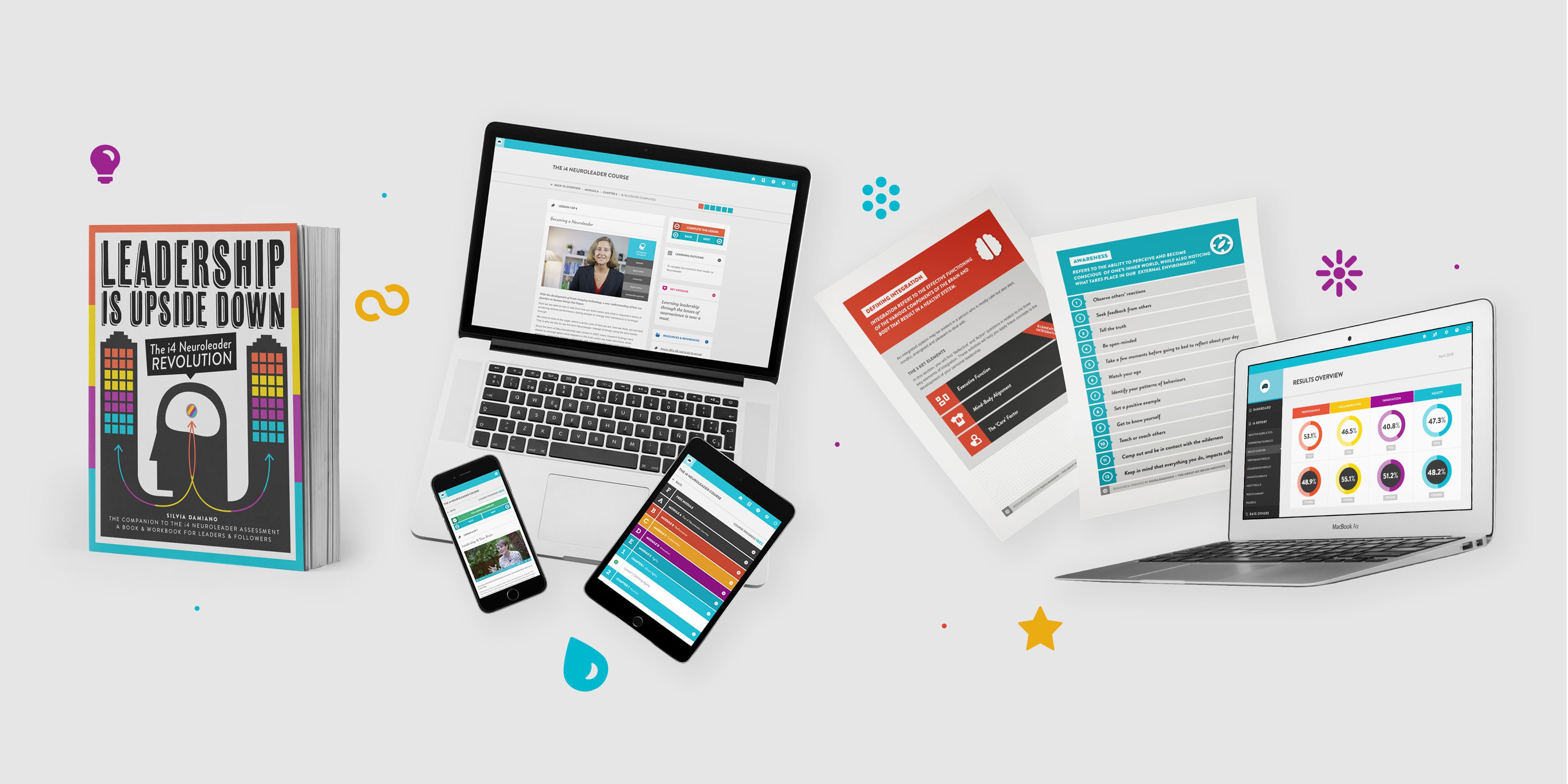Running the i4 Neuroleader Program for Executives Virtually
From the moment the COVID-19 pandemic hit us all, I suspected we would no longer be able to do things as we had before. This virus has definitely changed us forever, creating new insights into how we work and live.
After the initial shock, many organisations realised they could continue with day-to-day operations, even if things were different. People could still receive leadership training, but from start to finish in an entirely virtual environment. Some may have experienced this well before this period, but being coached online, attending webinars, receiving feedback, and having video chats was pretty new, particularly for some companies.
When Hicham Kabaj, Managing Director for JESA, in Casablanca, Morocco, contacted me in early 2020 about doing a leadership program for his team, I was ecstatic. Delving deep into the minds of a group of executives worldwide, who were asked to work from home with heavy government restrictions, was a new experience for me. They had to lead big teams and inspire them despite the conditions while maintaining the balance between work and family responsibilities. This was not a simple scenario.
I had met Hicham in Sydney the year before during a Leadership Program that I conducted for the ‘John Grill Centre for Project Leadership’, part of the University of Sydney. We had a few conversations during the program, and I admired his inquisitiveness about becoming a better leader and taking this knowledge back to his colleagues. We never thought we would be working together again, this time to develop his executive team.
Hicham’s main priorities were for everyone to understand that they needed to go through these challenges together and that it was acceptable to feel the disconnection and the isolation. They also had to support their teams and continue to grow the company in a very complex environment.
He was adamant about the importance of knowing ‘self’ through seeking feedback from various stakeholders. We used the i4 Neuroleader Assessment, which provided participants with feedback from several stakeholder groups, including family and friends. Every member of the team found this feedback an eye-opener, as they were able to compare how they were dealing with the people in their lives and what groups they needed to improve their relationship with.
From the competencies of Performance, Collaboration, Innovation and Agility that make up the i4 Neuroleader Model, Hicham found Agility was crucial during the Pandemic lockdown. Not getting stuck in one way of looking at the world and becoming more flexible were key conversation points throughout our sessions.
Collaboration, and in particular communicating openly with each other, their teams and families also took prevalence. They had to learn the importance of expressing their needs and showing vulnerability to survive these conditions and continue to achieve.
In an interview I conducted with Hicham after the program, he highlighted the importance of investing in ourselves and our people. Anxiety, isolation and frustration were better understood and discussed from a completely new angle.
At the same time, more time at home meant time to reflect and gain a new understanding of how sometimes they would behave reactively and consequently less thoughtful and considerate towards others.
From this experience, I would like to share (with Hicham’s permission) these key learnings:
- Understanding that as people and leaders, we need to work on ourselves, take the time to do it and have the right tools and the right attitude.
- As leaders, they needed to inspire and communicate effectively with their teams. They realised this work never ends.
- They also found out that as an executive team, they could not afford to work in isolation. They needed to listen to each other better and be curious about each other’s challenges and personalities so they could get along better.
In summary, through this experience, I learnt the in’s and out’s of running the i4 Neuroleader Program for Executives in a full online mode and how to best present available resources to certified i4 Practitioners and their clients.
- i4 Neuroleader (353)
- Leadership & Culture (336)
- Brain Health & Wellbeing (206)
- Innovation (97)
- Performance (85)
- Our News (79)
- Collaboration (68)
- Agility (53)
- Practitioner Stories (44)
- In The Press (36)
- Make Me A Leader (33)
- Balance (31)
- Integration (30)
- Imagination (29)
- Awareness (23)
- Brain-Friendly Channel (22)
- Brain-Friendly Leadership (22)
- Communication (22)
- Curiosity (21)
- Inspiration (19)
- Intuition (19)
- Attitude (17)
- Courage (16)
- Adaptability (14)
- Case Studies (14)
- Drive (14)
- Generosity (13)
- Ethics (9)
- Mental Readiness (9)
- Influence (8)
- Retreat (8)
- Brain-Friendly Leadership (1)
- Oracle Cards (1)
- 1 November 2025 (2)
- 1 September 2025 (3)
- 1 August 2025 (5)
- 1 July 2025 (5)
- 1 June 2025 (2)
- 1 April 2025 (1)
- 1 March 2025 (8)
- 1 February 2025 (3)
- 1 September 2024 (4)
- 1 July 2024 (2)
- 1 June 2024 (6)
- 1 May 2024 (2)
- 1 April 2024 (3)
- 1 March 2024 (1)
- 1 November 2023 (1)
- 1 August 2023 (1)
- 1 July 2023 (2)
- 1 June 2023 (2)
- 1 May 2023 (4)
- 1 April 2023 (2)
- 1 March 2023 (7)
- 1 February 2023 (4)
- 1 January 2023 (1)
- 1 September 2022 (1)
- 1 May 2022 (3)
- 1 April 2022 (1)
- 1 March 2022 (5)
- 1 February 2022 (4)
- 1 January 2022 (4)
- 1 December 2021 (2)
- 1 November 2021 (4)
- 1 October 2021 (3)
- 1 September 2021 (6)
- 1 August 2021 (1)
- 1 April 2021 (1)
- 1 December 2020 (2)
- 1 November 2020 (1)
- 1 September 2020 (1)
- 1 August 2020 (1)
- 1 July 2020 (3)
- 1 June 2020 (4)
- 1 May 2020 (3)
- 1 April 2020 (4)
- 1 March 2020 (6)
- 1 February 2020 (4)
- 1 January 2020 (2)
- 1 December 2019 (3)
- 1 November 2019 (3)
- 1 October 2019 (5)
- 1 September 2019 (4)
- 1 August 2019 (4)
- 1 July 2019 (4)
- 1 June 2019 (5)
- 1 May 2019 (9)
- 1 April 2019 (9)
- 1 March 2019 (8)
- 1 February 2019 (7)
- 1 January 2019 (8)
- 1 December 2018 (5)
- 1 November 2018 (10)
- 1 October 2018 (16)
- 1 September 2018 (9)
- 1 August 2018 (10)
- 1 July 2018 (9)
- 1 June 2018 (8)
- 1 May 2018 (9)
- 1 April 2018 (9)
- 1 March 2018 (9)
- 1 February 2018 (8)
- 1 January 2018 (8)
- 1 December 2017 (6)
- 1 November 2017 (9)
- 1 October 2017 (9)
- 1 September 2017 (8)
- 1 August 2017 (10)
- 1 July 2017 (8)
- 1 June 2017 (8)
- 1 May 2017 (9)
- 1 April 2017 (8)
- 1 March 2017 (6)
- 1 January 2017 (3)
- 1 December 2016 (4)
- 1 November 2016 (5)
- 1 October 2016 (4)
- 1 September 2016 (2)
- 1 August 2016 (4)
- 1 July 2016 (4)
- 1 June 2016 (2)
- 1 May 2016 (3)
- 1 April 2016 (3)
- 1 March 2016 (7)
- 1 February 2016 (2)
- 1 January 2016 (5)
- 1 December 2015 (2)
- 1 November 2015 (2)
- 1 October 2015 (4)
- 1 September 2015 (2)
- 1 August 2015 (2)
- 1 July 2015 (1)
- 1 June 2015 (3)
- 1 May 2015 (4)
- 1 April 2015 (5)
- 1 March 2015 (3)
- 1 February 2015 (3)
- 1 January 2015 (3)
- 1 December 2014 (3)
- 1 November 2014 (3)
- 1 October 2014 (3)
- 1 September 2014 (5)
- 1 August 2014 (4)
- 1 July 2014 (5)
- 1 June 2014 (3)
- 1 May 2014 (1)
- 1 March 2014 (1)
- 1 December 2013 (2)
- 1 November 2013 (1)
- 1 July 2013 (1)
- 1 June 2013 (1)
- 1 May 2013 (3)
- 1 April 2013 (1)
- 1 March 2013 (2)
- 1 February 2013 (1)
- 1 January 2013 (2)
- 1 November 2012 (1)
- 1 October 2012 (1)
- 1 September 2012 (1)
- 1 August 2012 (2)
- 1 July 2012 (1)
- 1 June 2012 (1)
- 1 May 2012 (2)
- 1 April 2012 (1)
- 1 February 2012 (1)
- 1 January 2012 (1)
- 1 November 2011 (1)
- 1 October 2011 (3)
- 1 September 2011 (2)
- 1 July 2011 (1)
- 1 June 2011 (1)
- 1 May 2011 (1)
- 1 April 2011 (1)
- 1 March 2011 (1)
- 1 February 2011 (2)
- 1 January 2011 (4)
- 1 December 2010 (4)
- 1 November 2010 (3)
- 1 October 2010 (5)
- 1 September 2010 (4)
- 1 August 2010 (4)
- 1 July 2010 (3)
- 1 June 2010 (4)
- 1 May 2010 (7)
- 1 April 2010 (5)
Subscribe by email
You May Also Like
These Related Stories

Featured In ‘The 100% Human At Work’ Virgin Unite Initiative & Awarded Finalist in AITD’s Best Leadership Programs

Awareness – The Key To Knowing What’s Really Going On?



No Comments Yet
Let us know what you think